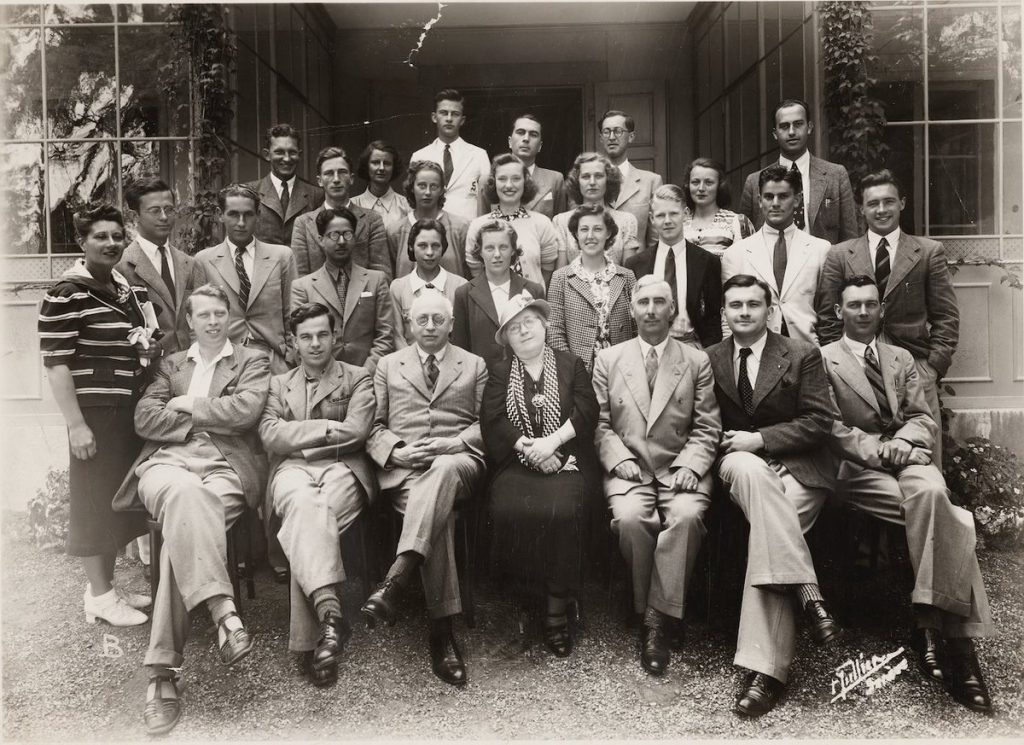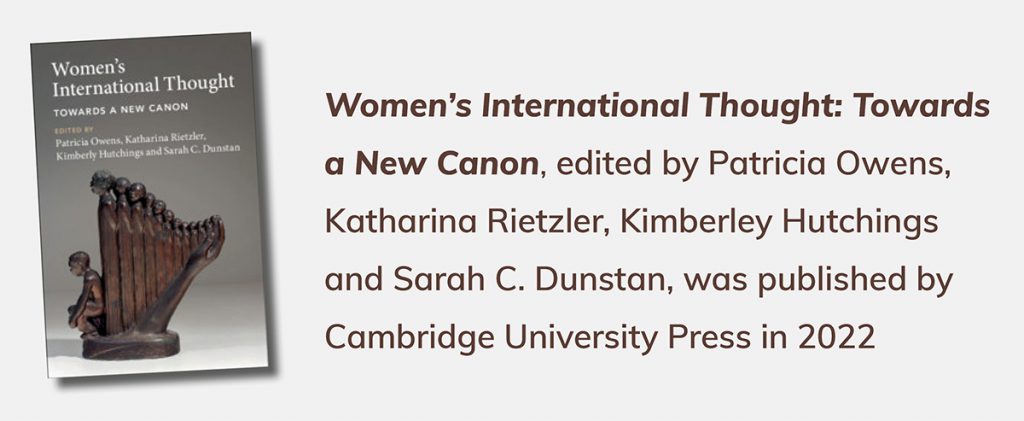'A nasty woman', 'terrible witch', 'abrasive', 'overpoweringly verbose', 'frightening' and 'short of tact and discretion'. This is how the musician, cultural diplomat and intellectual Lucie Zimmern (1875–1963) appears in contemporary accounts. Other observers, however, described her as 'an accomplished scholar', 'cultured and charming', even 'brilliant'. Katharina Rietzler and Patricia Owens find that Lucie Zimmern's international thought has been overshadowed by the vitriol
Lucie Zimmern is perhaps the archetypical ‘difficult woman’ of the historiography of interwar International Relations (IR). Most accounts identify her as the wife of international theorist Alfred Zimmern. Lucie was Alfred’s closest collaborator over almost four decades. Together they shaped interwar IR’s intellectual and institutional landscape. Today, her distinct contribution to this partnership and her own original approach to international affairs remain unrecognised, and overshadowed by selective readings of the archive of interwar IR. What was the making, then, of this 'terrible witch'?
French-born Lucie Hirsch was an accomplished pianist and singer who had trained at the Sorbonne in Paris. Following her first husband André Barbier to Britain in 1902, Lucie became a central figure in the musical Entente Cordiale, the cultural accompaniment to the growing political ties following the 1904 Anglo-French agreement. Lucie promoted the chamber music of France’s leading new composers and musicians in Britain, for aesthetic and diplomatic reasons. 'I feel convinced that music will contribute to bring peace in the world', she wrote in a letter to the Guardian,
Let us, then, have good music from all parts of the world – the beautiful has no nationality.
In 1909, Lucie became Assistant Lecturer in Music at the University of Wales in Aberystwyth, teaching music, singing, and conducting. This is where she met Alfred Zimmern, Aberystwyth’s inaugural Professor of International Politics. Existing assessments treat her subsequent divorce from André and marriage to Alfred in 1920 as a significant setback only in Alfred’s career. Yet it cost both their academic posts, and their life in Wales.
In the early 1920s the pair co-founded the Geneva School of International Studies. The so-called Zimmern School was a summer course that attracted students from all over the world. The School swiftly established itself as one of the most successful internationalist pedagogical experiments of the interwar period.

Here, Lucie Zimmern outlined and taught the principles of her distinct interpretation of international affairs, 'polyphonic internationalism'. She suggested that the musical texture of polyphony could serve as an ordering principle for a world which had yet come to terms with human diversity. In its ideal form, polyphonic singing involves no hierarchy, as each part functions as an independent melody of equal importance.
For Lucie Zimmern, the connections between music and internationalism were visceral. As she wrote in her 1932 book on the League of Nations,
International interdependence cannot be preached. It has to be experienced.
Transnational cultural interchange and appreciation of the beauty and significance of musical cultures were meant to effect a psychological, embodied transformation necessary to reform world politics.
As one student recalled in 1930, quoting Lucie, 'music appreciation is just as essential to world peace as is the study of international problems… "If you can’t sing in harmony or feel the rhythm of a piece of music, you don’t have polyphonic souls, and if you don’t have polyphonic souls [then] you can never understand world problems"'. World politics was not polyphonic in the simple sense of merely 'more than one', but of many and different.
Lucie’s core teaching was consonant with Alfred’s attempt to theorise the basis for a new international order. His vision was a federation of culturally mature nations, including many without their own state but within multinational empires or as colonies. Alfred famously rejected the principle of state sovereignty as the basis of international order. Instead, he conceived a new order based on a federation or commonwealth of nations, beyond racial categories.
However, both Zimmerns praised the world-ordering effects of the British Empire. They hoped that appreciation for national cultural traditions would depoliticise national sentiments and demote racial categories.
There was an obvious contradiction between the Zimmerns’ vision of international order as hierarchically structured, with a hegemonic centre, and the polyphonic principles of independent forces interweaving harmoniously. Polyphony as a metaphor implied a rejection of hierarchy. Yet its origin was considered intrinsically European, certainly in the 1920s and 1930s.
Polyphonic internationalism was culturally and racially elitist.
Oswald Spengler’s widely read 1918 book The Decline of the West argued that polyphony emerged at the dawn of a distinctly Western civilisation. Spengler characterised this polyphony as 'Faustian'; uniquely driven by the pursuit of unreachable goals. And what goal could be more unattainable than world peace? Polyphonic internationalism incorporated the pre-modern universalisms of Western Christendom. While it promoted the appreciation of human diversity, it did so from an aesthetic and intellectual standpoint that was self-consciously 'occidental'.

The Zimmern School closed in 1939. While some of its former employees and alumni became leading figures, the School would never recover its prominence. The Zimmerns emigrated to the US in 1947. There, prominent scholars defined the new postwar IR discipline in opposition to the thought and pedagogy practiced at the Geneva School. American IR scholarship deemed the Geneva School too focused on the workings of the League of Nations. It was too open to questions of gender, race, and psychology, too idealist and emotional.
Yet Lucie Zimmern’s polyphonic internationalism expands existing accounts of liberal internationalism. It reveals early and prominent efforts to think about culture, emotions and international relations. Her career, such as it was, also highlights multiple disciplinary routes to international thinking. Unlike many of the well-known men (and increasingly women) of interwar international relations, Lucie trained neither in law, classics, history, nor the social sciences, but in music. This highly disciplined and systematised practice of human creativity was lost to IR as it was consolidated after 1945 as a subfield of political science.
This post is based on the authors' 2023 article in International History Review:
Polyphonic internationalism: The Lucie Zimmern School of International Studies
[…] Image: Photo Alfred and Lucie Zimmern (front row, centre), with students of the ‘Zimmern School’ © The European Consortium for Political Science’s blog, The Loop. […]